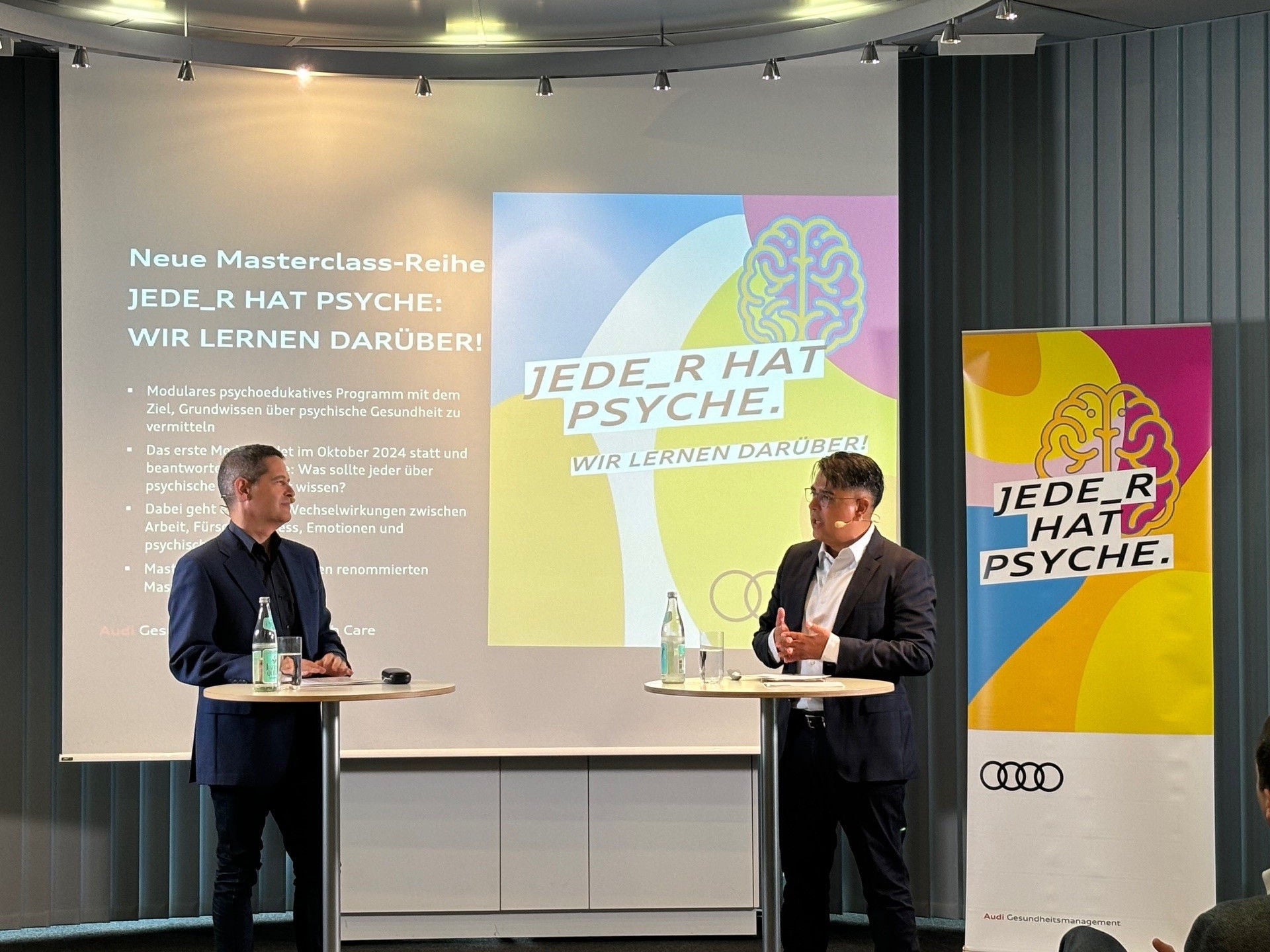Mental health as part of the corporate culture
missing translation: fa.article-intro.reading-time – 09/18/2025

The Audi Healthcare team. Nora Hinz, Julia Koerner, Elena Bierwirth, Luis Escobar Pinzon, Oliver Stubenvoll
We see mental health not only as a competitive advantage, but as a fundamental prerequisite for humane and healthy work design. Balancing professional demands and private challenges can be challenging, which is why we actively support our employees in balancing their well-being with their day-to-day work.
A work program in three phases: removing taboos, support and psychoeducation
As early as 2019, Audi launched the mental health work program "EVERYONE HAS MENTAL HEALTH" with a destigmatization campaign under the motto "WE TALK ABOUT IT!". The aim was to promote an open approach to mental illness and to break down taboos within the company.
In the second phase, "WE TALK ABOUT IT" (2021–2022), a separate concept for psychological counseling was developed based on the Audi Checkup: the Mental Health Checkup. This offer enables employees to reflect on their mental health at an early stage and to strengthen it preventively – free of charge and during working hours.
The third and current phase "WE LEARN TOGETHER" began in 2023 with the establishment of the Mental Health Care Team. Since then, evidence-based counselling, education and care services have been developed – both individual and systemic – for employees, managers and entire areas of work.

We want to give people the tools to stay healthy and not get into crisis situations in the first place, which then require therapy.
Dr. med. Andreas Haller, Head of Healthcare at AUDI AG
Increasing health literacy through psychoeducation
At the heart of the psychoeducational program is the masterclass series "EVERYONE HAS MENTAL HEALTH: WE TALK ABOUT IT!"– a modular learning offer with the following modules:
• Fundamentals of mental health in a workplace context
• Special-Needs of vulnerable groups
• Common mental health diagnoses
Renowned experts have already been recruited as speakers, including Xavier Ros, Member of the Board of Management for Human Resources and Labor Director of AUDI AG, on the topic of "Work & Mental Health", and Prof. Dr. Johannes Siegrist on the topic of "Stress & Mental Health". The content of the masterclasses is available to all employees via the internal learning platforms after the face-to-face events.

I firmly believe that we can and should all learn more about mental health – after all, mental well-being is crucial for quality of life and performance.
Priv.-Doz. Dr. Luis Escobar, Mental Health Officer of AUDI AG in an interview with "Focus-Gesundheit", July 2025
Healthy working conditions – systematic and holistic
In addition to individual counseling, Audi relies on a systematic risk assessment of psychological stress in the workplace. The aim is to create a health-promoting work design that takes into account the following aspects:
• Work content
• Work organization and time
• Social support in the workplace
• Work equipment and environment
• Break promotion to reduce stress
Managers as the key to health culture
Health is also a matter of leadership. That's why all managers are trained in health-friendly handling – both for themselves (self-care) and for their teams (staff care). Formats such as the "Leadership Dialogue" and "In Contact with the Psyche" promote mindfulness, empathy and an open approach to mental health.
Support for reintegration
Audi also supports its employees in the event of a prolonged absence due to illness. As part of the company integration management, the ReStart Mental Health Checkup is currently being developed – for the best possible support when returning to everyday work.

